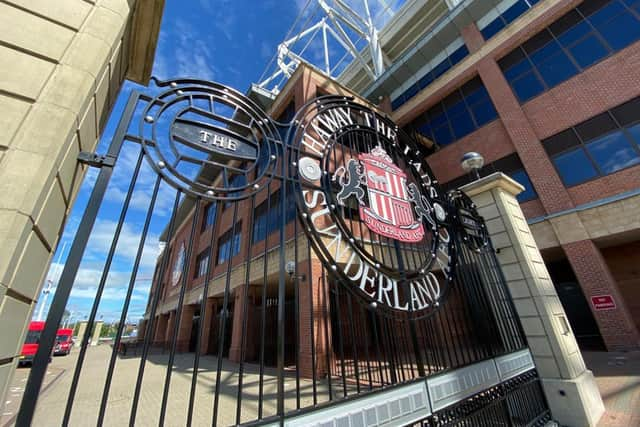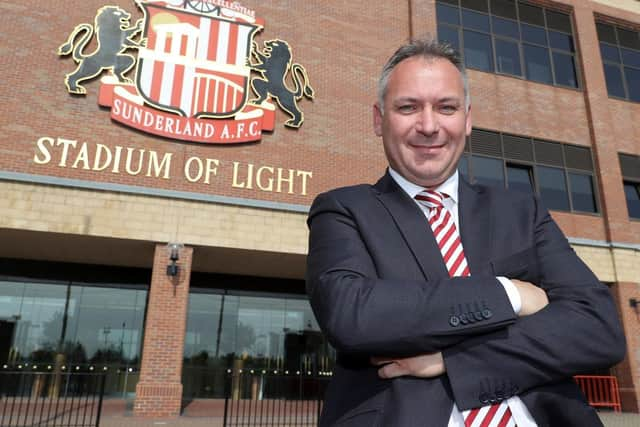Inside Sunderland's dramatic and acrimonious week: What's changed, what hasn't and what could come next as Stewart Donald resigns and duo depart
and live on Freeview channel 276
In the remarkable world of Sunderland AFC, the interim period had seen both his Head of Recruitment and his Head of Football Operations leave the club
Advertisement
Hide AdAdvertisement
Hide AdIn these most uncertain times for the world, many have reflected on that old Lenin saying: There are decades where nothing happens, and there are weeks where decades happen.
Welcome to our world. At Sunderland AFC, the latter has become our way of life.
The idea behind Thursday’s meeting appeared to be to try and reach something of a truce.
After a summer of continued discontent, there had been valid questions raised regarding Madrox’s intention to sell the club, and whether their financial demands had prevented it.
Donald had hoped to settle both.


Advertisement
Hide AdAdvertisement
Hide AdYes, he would still sell, and his asking price is what he (will have eventually) paid to purchase the club.
CEO Jim Rodwell said there was unity on the end goal (a sale) and that the club needed breathing space to achieve it.
Yet the result of the meeting was that at lunchtime on Saturday, supporter groups sent out a tweet in unison.
Accompanying the hashtags #donaldout and #ourfault was an image of the Stadium of Light scoreboard, highlighting the 46,039 who turned out for the Boxing


Day visit of Bradford City in 2018.
A simple but effective and timely message.
Advertisement
Hide AdAdvertisement
Hide AdThere had been some alarming things said in that ‘heated’ meeting, such as the claim that fans were putting off investors and risking the reputation of the club.Sadly, this was not an isolated message.
It’s a divisive rhetoric and one entirely untrue. Some of the comments made reflected a quite appalling lapse in judgement.
Donald’s position after the events of that day was untenable and in his resignation notes, he struck a markedly more conciliatory tone.
Advertisement
Hide AdAdvertisement
Hide AdOn Thursday there had been veiled threats that the situation could push him to sell to some of the questionable names that have been linked with a takeover.
Now, he restated his ‘personal commitment’ to finding a suitable buyer.
He also now thanked fans for the support they had given him ever since his arrival, and noted that their loyalty gave the club a surer footing that many others in the EFL.
Recognition, quite rightly, that the fans are not the problem at Sunderland.
Advertisement
Hide AdAdvertisement
Hide AdThose problems have been many, and this constant need to row back on claims or statements made by senior figures within days is one of them.
His resignation was not a certainly pre-planned move, or necessarily reflective of wider moved to make sweeping changes behind the scenes.
It came as a surprise to most, a decision seemingly made on the back of the chaos that had taken place in the previous days.
In the longer term, it changes precious little when it comes to the state of play at Sunderland.
Advertisement
Hide AdAdvertisement
Hide AdThe appointment of Rodwell in April signalled that Donald was all but stepping back from his role in terms of the day-to-day running of the club and a takeover
is no closer, either.
Donald’s asking price for the club remains £37.6 million, a price that he was highly unlikely to land in a normal climate, and one that he almost certainly will not
in these times.
As a result, many fans will pay the news relatively short shrift and the pressure urging a change in that price and a sale will not change.
In fact, it may well redouble.
Donald's decision perhaps only becomes more significant in the content of Tony Coton and Richard Hill’s departures hours previous.
Advertisement
Hide AdAdvertisement
Hide AdIn a dizzyingly short space of time, the structures of decision making at Sunderland, which were for the last two years so often made out of Oxfordshire, have
been almost entirely untied.
Hill has been Donald’s key lieutenant in the footballing department from day one. Sunderland’s majority shareholder poured cold water over reports that he
was arriving as a Director of Football in 2018, insisting that the manager would have the final say on transfers.
That was the case, though one high-profile example showed how easily this could become muddled in the dysfunctional structure that was operating.
Advertisement
Hide AdAdvertisement
Hide AdHill effectively held the purse strings and as the key link to Donald, has been an extremely influential figure in leading the club’s transfer and contract negotiations, from the first team down the academy.
Donald raised many an eyebrow in claiming that he ‘saved the club’ with his uncompromising approach to dealing with wantaway players in 2018, but this style also means that you do not have to go far to find agents and other clubs who have been left alienated by their dealings.
As such, some key departures and poorly handled talks mean the legacy is not one that will be celebrated.
Coton is one of many from the Madrox era who might fairly say that his work should be judged against the environment he operated in, with the paucity of the club’s scouting network under Donald well discussed.
Advertisement
Hide AdAdvertisement
Hide AdThere were some notable successes, mainly in the additions Jordan Willis and Luke O’Nien.
In truth, though, these clever signings, young, athletic, talented and with potential to realise, only served to underline the lack of an overarching and coherent vision more generally.
Their departures reflect a clear changing of the guard ahead of a third season in League One.
Advertisement
Hide AdAdvertisement
Hide AdHe stressed the need to find young talent with resale value to reduce the dependence on owners, and these remarks are only more relevant when salary caps
loom, Donald wants out and the club’s revenues declining in the COVID-19 era.
Advertisement
Hide AdAdvertisement
Hide AdIn this sense, change has begun and the recent departures will only accelerate it.
With Paul Reid departing as Academy Manager, we have in three weeks seen Donald’s network at the club taken part.
In that there is opportunity as much as there is concern.
That football structure (or lack of), laid so bare on Sunderland 'Til I Die, muddled at best and downright unprofessional at worst, is cleared. Few will mourn it.
In no circumstance would it be considered ideal to replace so many major roles at once. For so much of this summer, football’s return has seemed a distant prospect.
Advertisement
Hide AdAdvertisement
Hide AdNow, with so many key roles to replace and so many players to be signed, the proposed September 12th date seems to loom large on the horizon.
Interviews for Reid’s replacement are imminent and Donald’s replacement is set to be decided at the next board meeting.
That will be an interesting decision, given that Rodwell is already CEO and that Tom Sloanes' comments at the recent meeting were as divisive as any.
Given his incredibly close connection to Donald, it is surely inconceivable that Neil Fox would take on the role.
Advertisement
Hide AdAdvertisement
Hide AdSupporters are therefore treating Donald's departure with a healthy dose of scepticism and amid everything else going on, they will be asking: what next? And quite.
Donald’s resignation does little to change the bigger picture and will do little to quell the understandable unrest, but in the interim, Sunderland’s football operation is set for a major change.
